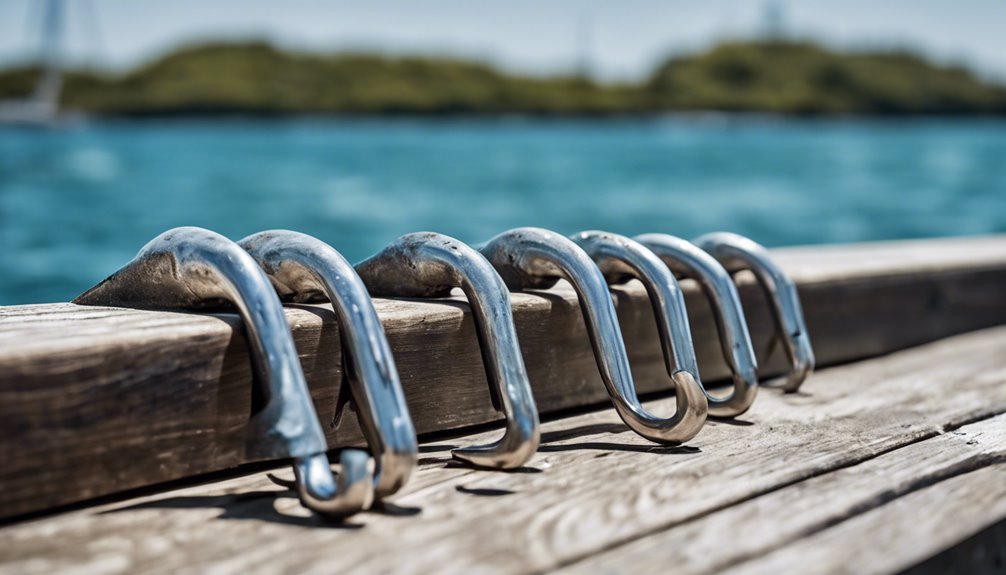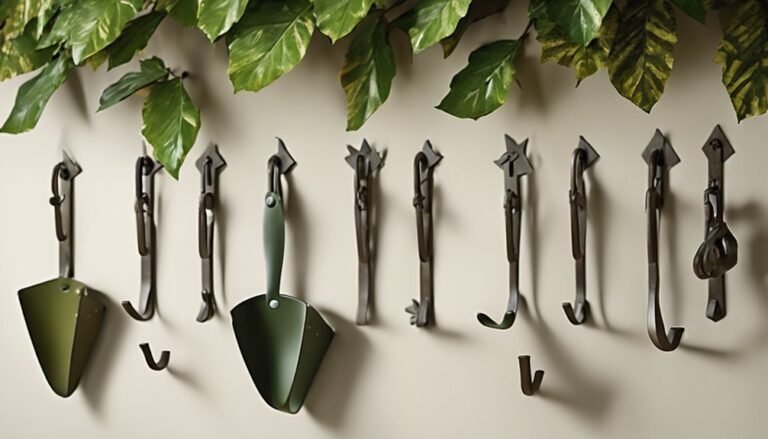Best Hooks for Securing Boats and Yachts
When securing boats and yachts, you need hooks made from corrosion-resistant materials like stainless steel or galvanized metal for durability. Consider ergonomics for comfort and collapsible designs for easy storage. Heavy-duty options are ideal for harsh marine conditions, while lighter hooks guarantee ease of handling. Always look for trusted brands such as Attwood or SeaDog, and remember that proper maintenance prolongs hook life. Explore the various types and features to find the perfect fit for your needs.
Types of Hooks for Boat Security
When it comes to securing your boat or yacht, understanding the various types of hooks available can considerably enhance your safety measures. Different hook materials play an essential role in ensuring boat safety. For instance, stainless steel hooks are resistant to corrosion and provide durability, making them ideal for marine environments. Nylon hooks are lightweight and flexible, offering good options for quick securements. Additionally, consider galvanized hooks, known for their strength and resistance to rust, which are great for heavy-duty applications. Each type of hook serves a specific purpose, so evaluating your needs and the environment will guide you towards the best choice. Prioritizing the right hooks not only secures your vessel but also gives you peace of mind while enjoying the open water.
Features to Look for in Boat Hooks
While selecting the right boat hooks, it is crucial to take into account several key features that enhance functionality and safety. First, consider hook materials; stainless steel offers durability and corrosion resistance, while aluminum provides a lightweight option. You’ll want to choose materials that withstand harsh marine environments. Next, evaluate hook sizes based on your specific needs; longer hooks are ideal for reaching distant cleats, while shorter hooks work well in tighter spaces. Additionally, look for ergonomic grips that provide comfort during use, especially in challenging conditions. A collapsible design can also be beneficial for easy storage. By focusing on these features, you’ll guarantee that your boat hooks are both effective and reliable, allowing for a seamless experience on the water.
Top Brands for Marine Hooks
Choosing the right features for your boat hooks sets the stage for understanding which brands excel in the marine industry. Well-known marine hook brands like Attwood, SeaDog, and Lewmar offer a range of products that cater to different needs. Attwood is recognized for its durable aluminum hooks, while SeaDog specializes in hooks made from high-quality stainless steel, known for their corrosion resistance. Lewmar’s offerings often incorporate composite materials, providing lightweight yet strong options. These popular hook materials not only enhance performance but also guarantee longevity, giving you the freedom to explore without worry. Selecting the right brand can make all the difference in your boating experience, allowing you to enjoy your time on the water to its fullest.
Heavy-Duty Hooks for Yachts
Heavy-duty hooks for yachts are essential for ensuring secure mooring and reliable docking in various conditions. These hooks, crafted from heavy duty materials like stainless steel or galvanized metal, provide the strength needed to withstand harsh marine environments. Their robust construction guarantees that you can rely on them for secure fastening, preventing any unwanted movement of your vessel. When selecting heavy-duty hooks, consider features like corrosion resistance and load capacity to match your yacht’s specifications. By investing in quality hooks, you’re not just enhancing safety; you’re also enabling greater freedom to explore the waters without worry. With the right heavy-duty hooks, you can confidently dock your yacht, knowing it’s firmly secured against the elements.
Lightweight Hooks for Easy Handling
When choosing lightweight hooks, you’ll want to focus on durable materials that provide strength without the extra weight. Ergonomic design features can also enhance your handling experience, making it easier to secure and release your boat or yacht. Prioritizing these elements guarantees you maintain both functionality and ease of use on the water.
Durable Materials for Strength
The ideal hook for securing boats and yachts combines durability and lightweight construction, ensuring ease of handling without sacrificing strength. When considering materials, you often face the choice of steel vs aluminum. Steel offers superior strength and impact resistance, making it highly effective for heavy-duty applications. However, aluminum hooks are considerably lighter, providing easier handling without compromising performance. If you prioritize portability and ease of use, aluminum might be your best bet. Meanwhile, if maximum strength and durability are essential, steel hooks could be the way to go. Ultimately, your choice should reflect your specific needs, balancing the demands of strength with the desire for lightweight convenience to enhance your boating experience.
Ergonomic Design Features
Ergonomics plays an essential role in the design of lightweight hooks for securing boats and yachts. When you’re out on the water, you need tools that enhance your experience, not hinder it. Lightweight hooks, featuring an ergonomic grip, allow for easy handling and quick adjustments, giving you the freedom to focus on your adventure. These hooks are crafted to minimize strain on your hands, ensuring user comfort during prolonged use. The thoughtful design reduces fatigue, which is vital during those hectic moments when securing your vessel. By choosing hooks that prioritize ergonomic features, you’ll find that handling and maneuvering becomes a breeze, enhancing your overall boating experience. Efficient, comfortable, and reliable—these hooks are essential for every boater seeking freedom on the water.
Corrosion-Resistant Hooks for Saltwater Use
Since saltwater environments can be particularly harsh on metal components, choosing corrosion-resistant hooks is essential for boat and yacht owners. These hooks are specifically designed to withstand the rigors of saltwater exposure, ensuring long-lasting performance and reliability. When selecting hooks, look for materials like stainless steel or specialized coatings that enhance corrosion resistance. Such features not only improve saltwater durability but also reduce maintenance efforts, giving you more freedom to enjoy your time on the water. Remember that the right hook can make a significant difference in securing your vessel against the elements. Investing in high-quality, corrosion-resistant hooks will ultimately protect your investment and enhance your boating experience. Choose wisely, and sail with confidence!
Installation Tips for Secure Hooking
When installing hooks for secure hooking, it’s crucial to guarantee that each hook is mounted correctly to prevent any accidents or failures at sea. Begin with proper hook placement; position them in areas that can withstand the forces experienced during rough waters. Utilize securing techniques like double-checking the tightness of screws and using backing plates to distribute stress evenly. Verify the hooks are made from corrosion-resistant materials, especially in saltwater environments. Always consider the weight and size of the items you’ll be securing, as this impacts the hook’s load capacity. Finally, test each hook after installation to confirm its stability and reliability, ensuring your boating experience remains safe and enjoyable.
Maintenance and Care for Your Hooks
To guarantee your hooks maintain peak performance, regular cleaning is essential to remove debris and salt buildup. You should also inspect them for any signs of wear, as even minor damage can compromise their integrity. Finally, proper storage techniques can prevent corrosion and prolong the life of your hooks.
Regular Cleaning Practices
Regular cleaning practices are essential for maintaining the integrity and performance of your boat and yacht hooks. To guarantee peak functionality, aim for a cleaning frequency of every few weeks, especially after exposure to saltwater or harsh conditions. For effective cleaning, gather appropriate cleaning supplies such as mild soap, freshwater, and non-abrasive sponges. Avoid harsh chemicals that can corrode metal.
Start by rinsing off any salt and debris, then apply the soap with a sponge to remove grime. Rinse thoroughly with fresh water to prevent residue buildup. Dry the hooks completely to avoid rust. Regular maintenance not only prolongs the life of your hooks but also guarantees they perform reliably when you need them most, giving you peace of mind on the water.
Inspecting for Wear
Although hooks are designed for strength and durability, routine inspections for wear are essential to confirm their continued effectiveness. Regular checks help you identify potential issues before they compromise your safety. It’s vital to establish an inspection frequency—ideally, before each use and at the start of each season. Pay close attention to these wear indicators:
- Surface Cracks: Inspect for any visible fractures that could weaken the hook’s integrity.
- Corrosion: Look for rust or pitting that may signal deterioration.
- Deformation: Confirm the hook maintains its original shape; any bends can affect performance.
Proper Storage Techniques
After guaranteeing your hooks are in good condition through thorough inspections, proper storage plays a significant role in maintaining their longevity and functionality. When it comes to boat storage, choose a cool, dry environment away from direct sunlight. This prevents corrosion and degradation. Use protective cases or bags to shield your hooks from dust and moisture. Additionally, consider organizing your hooks by type for quick access; this enhances your securing techniques when you’re ready to set out. Avoid cramped spaces that can lead to bending or damage. Regularly check your storage area for signs of pests or rust, guaranteeing your hooks are always ready for action. Proper care guarantees your freedom on the water remains uninterrupted.
Customer Reviews and Recommendations
When choosing the best hooks for securing your boat or yacht, customer reviews and recommendations can provide invaluable insights. Analyzing customer feedback and user experiences helps guarantee you make informed decisions. Here are three key factors to take into account:
- Durability: Look for hooks made from corrosion-resistant materials that withstand harsh marine environments.
- Ease of Use: Customers often highlight hooks that are straightforward to install and remove, enhancing user experience during docking.
- Load Capacity: Confirm the hooks can handle the weight of your boat or yacht, as recommended by fellow boaters.
References
- https://en.wikipedia.org/wiki/Boat_mooring
- https://www.boats.com/how-to/how-to-choose-the-right-boat-anchor/
- https://www.seasafety.co.uk/boat-securing-tips/
- https://www.uscgboating.org/recreational-boaters-guide/
- https://www.dnr.state.mn.us/boating/faq.html
- https://www.boatingmag.com/boating-tips/secure-your-boat/
- https://www.abc.net.au/news/2021-07-06/how-to-secure-your-boat/100270808
- https://www.boat-ed.com/boating-resources/secure-your-boat/
- https://www.nasbla.org/
- https://www.grandlakes.org/boating-safety-tips/







